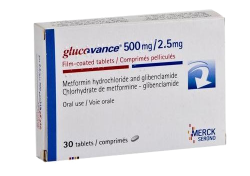Glucovance (glyburide/metformin) Coupons, Discounts & Cost
Glucovance (glyburide/metformin) is a hypoglycemic agent for oral administration. One way to save money on the Glucovance (glyburide/metformin) retail cost regardless of income and insurance status is to use Glucovance coupons or discount cards from RXCoupons. Use our Glyburide/Metformin coupons at your online pharmacy and receive up to 75% off the sale price each time you refill your prescription.
Glucovance (glyburide/metformin) drug information
Glucovance (glyburide/metformin) is a hypoglycemic agent for oral administration. It is prescribed for adult patients with type 2 diabetes in the following cases: - If previous monotherapy with other drugs (along with diet and exercise) was not effective; - If combination treatment with metformin and sulfonylureas in patients with stable blood glucose level should be replaced with monotherapy.
Glucovance (glyburide/metformin) contraindications
The drug is contraindicated in type 1 diabetes, diabetic precoma and coma, diabetic ketoacidosis, lactic acidosis, renal and hepatic impairment, acute conditions that cause changes in renal function (severe infection, dehydration, shock), porphyria, acute or chronic respiratory or heart failure, recent myocardial infarction.
Glucovance should not be used during pregnancy and breastfeeding.
Other possible contraindications include: simultaneous administration of miconazole, acute alcohol intoxication, alcoholism; hypocaloric diet (less than 1000 kcal per day), glucose-galactose malabsorption, galactose intolerance, lactase deficiency, hypersensitivity to the drug or other derivatives of sulfonylurea.
Precautions: thyroid diseases, adrenal insufficiency, anterior pituitary hypofunction.
Glucovance (glyburide/metformin) instructions for use and dosage
It is recommended to take this drug during the meal (your diet must contain a large amount of carbohydrates). The initial dose is 1 tablet (2.5 mg/500 mg or 5 mg/500 mg) once a day. If previously on metformin and sulfonylurea treatment, the initial dose of Glucovance should not exceed the daily dose of previously taken drugs. For effective control of blood glucose, the dose should be increased gradually (no more than by 5 mg/500 mg every two weeks or less). Dose adjustment should always depend on the blood glucose level. The maximum daily dose is 4 tablets of 5 mg/500 mg or 6 tablets of 2.5 mg/500 mg.
You can take the drug in a variety of ways (it depends on the daily dose): 1 tablet (any dosage) - once daily in the morning; 2 or 4 tablets (any dosage) - 2 times a day, morning and evening; 3-6 tablets - 3 times a day, in the morning, afternoon and evening. The initial dose for elderly patients should not exceed 2.5 mg/500 mg. Elderly patients taking Glucovance should regularly monitor renal function.
Glucovance (glyburide/metformin) adverse reactions
Digestive system: very often - lack of appetite, nausea, abdominal pain, vomiting, diarrhea. These symptoms usually appear at the beginning of treatment. Metabolism: hypoglycemia, porphyria; very rarely - lactic acidosis. Long-term therapy - reduction of vitamin B12 concentrations (may result in megaloblastic anemia). Hematopoiesis: rarely - thrombocytopenia, leukopenia; very rarely - pancytopenia, hemolytic anemia, bone marrow aplasia, agranulocytosis. Skin: rarely - itching, rash; very rarely - exfoliative dermatitis, erythema multiforme, photosensitivity. Allergic reactions: rarely - urticaria; very rarely - allergic vasculitis, anaphylactic shock, cross-hypersensitivity to sulfonamides and their derivatives. Other reactions: common - metal taste in the mouth; very rarely - functional disorders of the liver, hepatitis, hyponatremia.
Glucovance (glyburide/metformin) Specific guidance
Patients should regularly check their blood glucose levels during treatment. It is necessary to be informed of lactic acidosis risk (abdominal pain, severe malaise, muscle spasms and dyspeptic disorders). When taking Glucovance, patients are at high risk of hypoglycemia (especially in patients who are on a diet low in carbohydrates).
Taking Glucovance with alcohol can cause dangerous effects. Patients should consult a doctor immediately if they have symptoms of infectious diseases of the bronchi, lungs or urinary organs.

